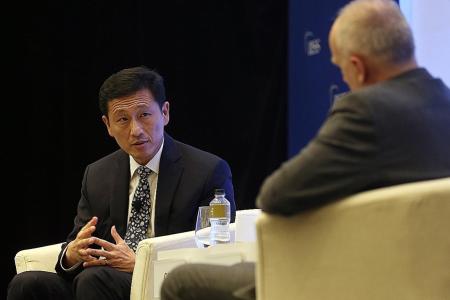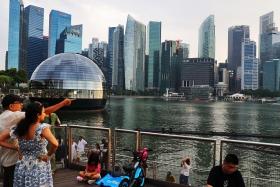Psychological defence vital during peacetime: Ong Ye Kung
Ong Ye Kung says that pillar of Singapore's Total Defence strategy is 'arguably stronger than military defence'
In Finland, the trust among its people is so powerful that they can even look up each other's tax returns online, and traffic fines are calculated as a proportion of the motorist's income.
This deep connection among the Finnish was cited by Second Minister for Defence Ong Ye Kung yesterday when he spelt out what is the most crucial form of defence in peacetime: psychological defence.
Said Mr Ong, who was in Finland last week: "It is a well-established social compact, which forms the bedrock of social cohesion and psychological resilience of a people.
"It is a cultural ballast, arguably stronger than military defence."
He was addressing defence officials, senior military officers and academics who had gathered here for a three-day meeting that will help shape the agenda of the annual Shangri-La Dialogue, the Asia-Pacific's foremost defence summit, to be held in Singapore in June.
Mr Ong defined psychological defence as trust among people and faith in government, together with a resilience against forces aimed at sowing discord.
One of the five pillars in Singapore's Total Defence strategy, psychological defence is critical as increasingly, conflicts are becoming unconventional, weapons are non-military and enemies are non-state players, he noted.
He also identified some of the key security challenges in today's world for discussion at the meeting, organised by the International Institute for Strategic Studies. These include potential instability in the Korean peninsula, terrorism, online falsehoods and the retreat of globalisation.
Mr Ong, who is also Minister of Education (Higher Education and Skills), welcomed the "slight thawing'' in ties between North and South Korea as the North Koreans prepare to take part in the upcoming Winter Olympics.
As for the situation in the peninsula, he said things are not so clear-cut.
"This is an uncertainty all countries in the region will have to live with and manage," Mr Ong added.
Terrorism continues to be one of the region's most serious concerns, he said.
Although the Philippine Armed Forces ended its five-month battle against militants linked to the Islamic State in Iraq and Syria in Marawi recently, "it would be foolish to believe this victory has snuffed out terrorism in the region".
Fake news is also increasingly undermining Singapore's social fabric and unity, he said.
"The techniques used are sophisticated, to give the illusion of public interest, legitimacy and support for the falsehoods and influencing public opinion."
Measures, such as legislation and regulatory safeguards, have been taken by some countries. Mr Ong cited Germany's Network Enforcement Act, which requires large social networks to take down illegal content, such as hate speech.
In Singapore, the Government has released a Green Paper to highlight the threat of deliberate online falsehoods. It has also set up a Select Committee to get views from the public.
"We are stepping up our efforts to train servicemen in conducting urban battles, and building up our cyber defence capabilities," Mr Ong added.
As for globalisation, he said it has brought economic progress, opportunities and growth. But the benefits are not obvious to people in many countries, "who may continue to suffer joblessness, stagnant wages, environmental degradation, and widening social disparity".
Get The New Paper on your phone with the free TNP app. Download from the Apple App Store or Google Play Store now


